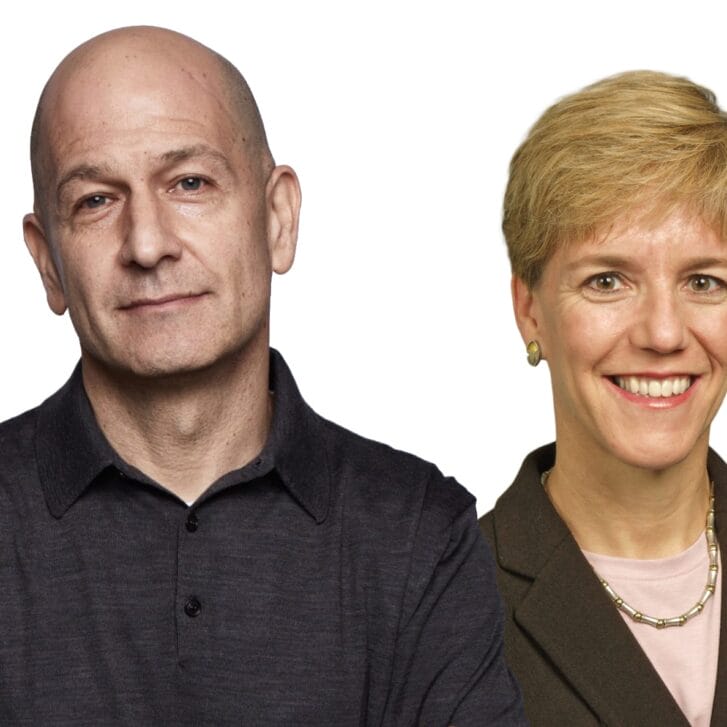Time. We never seem to have enough of it. And it also moves incredibly fast, ushering in transforming changes in the way business is conducted – and in the way business schools must operate. Students want to finish their degrees in shorter stretches. The new economy is moving so fast that they don’t want to miss its opportunities. But they also need the solid background that only a truly comprehensive business school education can provide.
Alumni are asking us how they can “get up to speed” on emerging issues. They need more than a week of executive education – but they don’t need another degree. They need something in between – a concentrated, rigorous program that is interdisciplinary in its approach.
And everyone wants education in different formats. Over the Internet. In their own homes or offices. On-site in hands-on internships. They want the kind of high-quality programs Wharton is known for, but they want them in more flexible designs.
So the challenge for Wharton is to transform the way we do our job. This is the driving force behind the $425 million Campaign for Sustained Leadership.
This international effort will fuel the relentless innovation that has become synonymous with Wharton. Research to create the knowledge that sets the course of business. Academic programs focused on emerging issues. Advanced technology-enhanced learning tools. And the state-of-the-art Huntsman Hall and global outreach that create the best learning venues on campus and around the world. All focused on giving people the tools to lead in the new economy and beyond.
The following pages outline our goals and our progress, and introduce some of your fellow alumni who have stepped up to invest their time and resources in Wharton’s future. It’s a future I hope you’ll help us design and build.
Time is valuable – and no moment in Wharton’s history has been as important as this.
Patrick T. Harker, Dean
Staying Ahead of the Game
Remarkable success comes from remarkable leadership. In 1996, the Campaign for Sustained Leadership began its “quiet phase.” Since then, over $280 million has been raised. The Campaign has reached this level largely because of the contributions and commitment of the Campaign Steering Committee, a group of individuals who are outstanding business and civic leaders.
At the head of the Campaign Steering Committee are three individuals who share a long history with the School and the vision to lead Wharton into the new century:
Jon M. Huntsman, W’59, H’96 – Campaign Chair Chairman and CEO, Huntsman Corporation

Mr. Huntsman is an active leader in the Wharton community, serving on the Board of Overseers since 1985 and becoming chairman of the Overseers this past year. In 1999, he was the recipient of the Wharton School’s Alumni Award of Merit.
Geoffrey T. Boisi, WG’71 – Campaign Co-Chair Vice Chairman, Chase Manhattan Bank

A leader in the Wharton community, Mr. Boisi serves on the Board of Overseers and was chairman of the Wharton Graduate Executive Board from 1985 to 1991. In 1993, he received the Alumni Association Distinguished Service Award.
Michael L. Tarnopol, W’58 – Campaign Co-Chair Vice Chairman, Bear, Stearns & Co., Inc.

Mr. Tarnopol has long been a leader in the Penn community, serving as a University Trustee and Wharton Overseer. He is the 1995 recipient of the Wharton Graduate Association’s Distinguished Service Award.
Making the Investment
Beth Nelson, WG’82: Music Major to MBA

“In my profession, you can either produce good numbers or you cannot,” Beth Nelson says. “Results are completely measurable. Having confidence in your ability is key, especially in difficult stock markets.”
Nelson, who is a managing director at Neuberger Berman, commuted from New York City to Wharton, where she attended the WEMBA program. “I was a music major as an undergraduate, and I always wanted to have a better handle on the courses you’d find at business school,” she notes. At Wharton, Nelson studied statistics, operations research, and computer applications, “all courses that a selfrespecting music major would not take.”
The tools Nelson gained from her coursework made her feel that she had more command of the field – enough to make a career change that has brought her to where she is today. “I felt like I could take a job that involved a great deal more risk than the one I had,” Nelson explains. “I could get through Wharton, after all.”
A major part of the WEMBA experience, according to Nelson, was being surrounded by a diverse group of working professionals. Nelson’s WEMBA class included 33 people from different fields and companies. “You learn quickly how certain personality types are aligned with certain professions, and you need to find the one that is right for you,” she says. “I learned a lot from observing the people around me, and in the end I knew I was in the right field.”
Nelson, whose husband is also a Wharton graduate, has remained in close contact with the School. She has served on Wharton’s Graduate Executive Board since 1995, and this spring, as part of a larger gift to Wharton, she committed $1 million to name a classroom in Huntsman Hall. Her gift is one of the largest the School has received from an alumna.
While working at Neuberger Berman, Nelson observed a number of her partners donating to charitable organizations. “That influenced me,” she says. “It’s important to remember that you had a helping hand while achieving your success.
Bill Mack, W’61: Technology as a Shaping Force

“Technological innovation brings together several disciplines and provides a basis for new things being done,” Bill Mack says regarding his recent gift to the Wharton School. “It touches on everything, from biotech to engineering to the Internet.” The gift – a $10 million donation made in1999 – has established the William and Phyllis Mack Center for Technological Innovation at the Wharton School. Mack, whose business arena is real estate, is president and chief executive officer of The Mack Company. Instead of investing in a real estate program, however, Mack says he went through a process of deciding how his money could have a more universal impact – not only at the School, but in our fast-changing world. “I entered the situation with an open mind,” he explains. “I began by asking [former dean] Tom Gerrity and then Pat Harker what they deemed to be priorities for the School. The more we discussed it, the more we came to a situation where I felt the future of the world has to do with technological innovation.”
The Center will be the cornerstone of the Wharton School’s efforts to understand technological innovation and its effects on all areas of management. It will provide graduate courses, a professorship and a high-visibility conference as well as support for high-impact research and publishing activities.
Mack says that he felt it was important to support a program that will provide a service to the University, students and the public. “Innovation in technology is the way mankind continues to advance and make a better place for itself,” he says.
Matt Greene, WG’89: Seeing a Unique Opportunity

Vance Hall is a vivid memory for Matt Greene. “It was very overcrowded, and from a tech standpoint, it wasn’t wired,” says Greene, who now works as managing director of the Equity Department at Utendahl Capital Partners. Greene was an MBA student at the time, and he particularly remembers the Vance Hall mail room, located in the basement of the building: “It was so full of people you couldn’t move.”
Greene says that whenever he and his fellow MBA students would go to Steinberg Hall-Dietrich Hall, they couldn’t help but compare the two buildings. “We all thought, ‘What a building! Why don’t we have this?’” he recalls.
Since then, Wharton has broken ground for its state-of-the-art academic building, Jon M. Huntsman Hall. Greene says that when he learned about the building he immediately saw a way to make a difference at the School. In the spring of 1999, he committed $150,000 to Huntsman Hall to name a group study room.
The room will be named The Greene Family Group Study Room, and it will include the names of his wife, Tita, and their two children, Matthew II and Kobi. “Someday, if my kids go to Wharton, they’ll see their names in that building,” he says.
Greene, who has remained connected to Wharton by serving on the Executive Committee of the Alumni Association, feels that the option to name a group study room was unique for a number of reasons. “As an African American,” he says, “I feel I have an opportunity to do something that my parents could not do.” Moreover, he adds, the gift helps to make a difference in a very concrete way. “I had never been exposed to the opportunity to help make such a tangible difference,” he says. “We needed a new building. You can actually visit it and see what you’ve helped to make happen. You can see that you’re part of something.”
Building Toward the Future
Since the initial groundbreaking ceremony in April of 1999, Jon M. Huntsman Hall is becoming an increasingly visible part of campus each day.

Campaign Milestones
- June 1996: The Campaign for Sustained Leadership begins its “quiet phase” under Dean Thomas P. Gerrity
- June 1997: $57 million is raised
- April 1998: Jon M.Huntsman, W’59 H’96 makes and unrestricted gift of $40 million
- June 19980: Campaign at $171 million
- April 1999: Groundbreaking for Jon M. Huntsman Hall
- June 1999: Campaign at $233 million
- August 1999: Patrick T. Harker , CE’81, GCE’81, GR’83, appointed Interim Dean of the Wharton School
- February 2000: Patrick T. Harker named Dean
- July 2000: Campaign at $280 million
- October 2000: International launch of the Campaign for Sustained Leadership


























